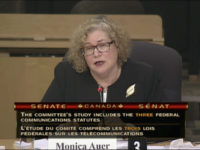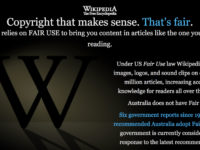Seeking to debunk many of the misleading claims on the state of Canadian copyright, fair dealing and education, I’m grateful that InfoJustice.org has published my post on the myths and realities of the current situation. The post relies on actual data presented at the recent copyright review to demonstrate how the Canadian market has experienced increased spending on licensing, e-book licensing has been a central part of the education licensing strategy, and educational institutions are paying for licences even when they retain collective licences.
Latest Posts
The LawBytes Podcast, Episode 9: The CRTC Watcher – A Conversation with FRPC’s Monica Auer
Many Canadians follow telecommunications and broadcast issues at the CRTC from a distance – the cost of wireless services, the speed of their Internet access, the availability of broadcasting choice. Others engage more closely on issues such as net neutrality, Cancon regulation, or Netflix taxes. But there is one Canadian who doesn’t just follow the CRTC. She watches it through the use of access to information laws that present a perspective on the CRTC that would otherwise remain hidden from view. Monica Auer, the Executive Director of the Forum for Research and Policy in Communications, joins the podcast this week to talk about insider access, slow reimbursement of costs for public interest groups, the number of CRTC meetings, and the Commission’s seeming indifference to commissioning original research. The interview is interspersed with comments from current CRTC Ian Scott taken from one of his first public speeches after being named chair in 2017.
The LawBytes Podcast, Episode 8: LawBytes Lecture – What the Canadian Experience Teaches About the Future of Copyright Reform
Earlier this spring, I delivered a keynote address at the Australian Digital Alliance’s 2019 Copyright Forum. The ADA is a leading voice on copyright issues in Australia and its annual Copyright Forum brings together government, creators, education, libraries, and the broader public to explore copyright issues. Coming off a holiday weekend with many celebrating Easter or Passover, this week’s Lawbytes podcast takes a different approach with a Lawbytes lecture, an audio recording of the ADA keynote, which used real data to dispel the misleading claims about the impact of Canada’s copyright 2012 reforms.
The podcast can be downloaded here and is embedded below. Subscribe to the podcast via Apple Podcast, Google Play, Spotify or the RSS feed. Updates on the podcast on Twitter at @Lawbytespod.
My ADA Keynote: What the Canadian Experience Teaches About the Future of Copyright Reform
In late March of this year, I travelled to Canberra, Australia to deliver a keynote address at the Australian Digital Alliance’s 2019 Copyright Forum. The ADA is a leading voice on copyright issues in Australia and its annual Copyright Forum brings together government, creators, education, libraries, and the broader public to explore copyright issues. This year’s event included innovative film makers, the President of the Australian Society of Authors, European Parliament MEP Julia Reda, as well as leading academics, trade negotiators, government policy experts, and many others.
My talk focused on the Canadian copyright experience, using real data to dispel the misleading claims about the impact of Canada’s 2012 reforms. A video of the keynote has been posted to YouTube and is embedded below.
Rewriting Canadian Privacy Law: Commissioner Signals Major Change on Cross-Border Data Transfers
Faced with a decades-old private-sector privacy law that is no longer fit for the purpose in the digital age, the Office of the Privacy Commissioner of Canada (OPC) has embarked on a dramatic reinterpretation of the law premised on incorporating new consent requirements. My Globe and Mail op-ed notes the strained interpretation arose last Tuesday when the OPC released a consultation paper signalling a major shift in its position on cross-border data transfers.











